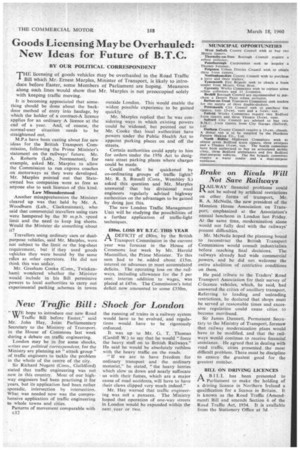New Traffic Bill :
Page 48

If you've noticed an error in this article please click here to report it so we can fix it.
Shock for London
4C E hope to introduce our new Road
WTraffic Bill before Easter," said Mr. John Hay, Joint Parliamentary Secretary to the Ministry of Transport, in the House of Commons last week during a debate on traffic engineering.
London may be in for some shocks, writes our political correspondent, for the Ministry are planning an "attack group" of traffic engineers to tackle the problem in the whole of the centre of the city.
Sir Richard Nugent (Cons., Guildford) stated that traffic engineering was not new in this country. Most of our highway engineers bad been practising it for years, but its application had been rather sporadic, intersection by intersection. What was needed now was the comprehensive application of traffic engineering to whole towns and cities.
Patterns of movement comparable with c12 the running of trains in a railway system would have to be evolved, and regulations would have to be rigorously enforced.
It was up to Mr. G. T. Thomas (Cardiff W.) to say that he would "force the heavy stuff on to British Railways." He said he would be absolutely ruthless with the heavy traffic on the roads, "If we are to have freedom for ordinary transport and the ordinary motorist," he stated, " the heavy lorries which slow us down and nearly suffocate ' us with their fumes, which are a major cause of road accidents, will have to have their claws clipped very much indeed."
Mr. Hay warned that traffic engineering was not a panacea. The Ministry hoped that operation of one-way streets in London would be expanded within the next year or two.
























































































































